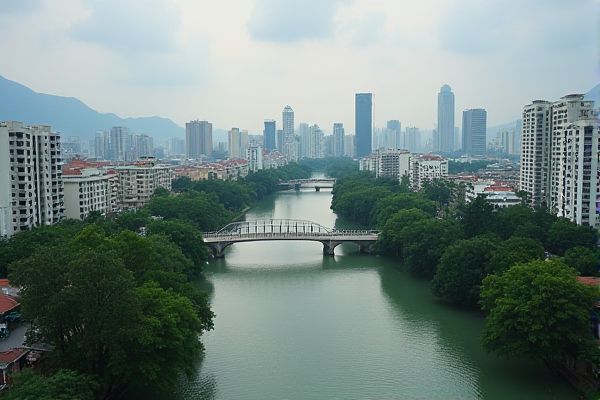
Housing market and best cities to live in Vietnam: Housing market stability. Affordable property prices. Major cities: Hanoi, Ho Chi Minh City. Emerging cities: Da Nang, Nha Trang. Expats communities in Saigon. Hanoi's cultural attraction. Coastal living in Vung Tau. Investment opportunities. Infrastructure development plans. Rental market trends.
Housing market stability
Vietnam's real estate market is exhibiting remarkable stability and sustainability, driven by strong demand for homes, especially in major cities such as Hanoi. In this vibrant city, apartment prices have surged, primarily due to a scarce supply and favorable low interest rates. The market's positive trajectory is further supported by conducive laws and a steady influx of foreign investment. As highlighted by an expert from The Investor, these factors collectively contribute to a robust property market that continues to attract both local and international investors.
Affordable property prices
In Ho Chi Minh City, affordable housing is scarce, with apartments under VND 3 billion accounting for only 18% of the new primary supply, and future affordable options are expected to be mainly in adjacent areas like Binh Duong. Other cities such as Can Tho, Da Nang, and Hue offer more affordable living costs and housing options compared to major cities like Ho Chi Minh City and Hanoi. For a detailed analysis of this issue, including the availability of new homes and market trends, visit the Savills Website.
Major cities: Hanoi, Ho Chi Minh City
In Q2 2024, Vietnam's housing market experienced a notable shift, especially in major cities such as Hanoi and Ho Chi Minh City, where residential transactions fell significantly by 30% due to elevated prices and cautious buyer sentiment. Conversely, land transactions surged by 28%, and new high-end apartment developments continued to materialize, with prices in Ho Chi Minh City ranging from VND72-142 million ($2,830-5,590) per square meter. For a detailed analysis of this dynamic market landscape, you can refer to the comprehensive report on Vietnam's Real Estate Split Reality.
Emerging cities: Da Nang, Nha Trang
Da Nang is emerging as a vibrant housing market, with a significant increase in apartment prices and demand in recent quarters. The city's stable economy, infrastructure projects, and plans for a free trade zone and tourism development make it an attractive destination for investors and residents. Notably, the Real Estate Market in Da Nang is gaining substantial momentum in this new cycle. Meanwhile, Nha Trang, though not as prominently highlighted, is also part of the central region seeing increased interest in real estate, particularly in the luxury and high-end segments driven by tourism and economic growth.
Expats communities in Saigon
In Ho Chi Minh City, expats often reside in districts like Thao Dien (District 2) and Phu My Hung (District 7), which are known for their concentrated expat communities and high-end living standards. These areas offer a vibrant expat lifestyle with access to various amenities and services.
Hanoi's cultural attraction
Hanoi, the capital of Vietnam, offers a rich cultural attraction with its blend of East and West, featuring well-preserved colonial and pre-colonial architecture, historical sites like temples and museums, and a strong cultural norm of friendliness and community interaction. Learn more about this unique and charming place to live on Wikitravel.
Coastal living in Vung Tau
Vung Tau offers a desirable coastal living experience with its clean and livable environment, excellent coast roads, fabulous sea views, fast transport connections, a good food scene, and clean beaches. For more detailed information about this charming destination, you can visit the Vung Tau City by the Sea website. The city is quiet and safe during the week, making it an attractive option for those seeking a calm and comfortable lifestyle by the sea.
Investment opportunities
Vietnam's housing market is becoming a magnet for foreign investors, who are drawn by favorable economic conditions, legal reforms, and the country's strategic infrastructure development. Major cities such as Ho Chi Minh City and Hanoi present prime opportunities in both retail and residential real estate sectors. The burgeoning urbanization and expanding middle class further bolster the Vietnamese real estate landscape, especially in the residential segment, where investment in high-rise apartments and integrated projects is thriving. This positive growth trend is echoed in extensive insights provided by the Real Estate Investment Guide Vietnam, which underscores the country's appeal across residential, commercial, and industrial sectors. For expats, the vibrant job markets and strong infrastructure in these cities make them not only appealing places to live but also promising avenues for real estate investment.
Infrastructure development plans
Vietnam's housing market, particularly in cities like Hanoi and Ho Chi Minh City, is expected to benefit from extensive infrastructure development plans. These plans include the construction of high-speed railways, expansion of airports, and modernization of ports, which will enhance connectivity and property values in these areas. For more detailed information on the country's transport infrastructure plans, the VietnamPlus website provides an in-depth overview of the necessary funding and the ambitious projects slated for completion by 2030. This strategic development is poised to significantly elevate the urban landscape and economic potential of Vietnam's major cities.
Rental market trends
The rental market in Vietnam is stable, driven by a high demand for housing, especially from foreigners and individuals purchasing homes for rental purposes. Serviced apartments are maintaining high occupancy rates and offering attractive rentals. This stability is further supported by new laws that enhance transparency and protect homebuyers. The market benefits from rapid urbanization, low interest rates, and government initiatives, with a notable shift towards integrated residential projects. These projects often include commercial and recreational spaces, meeting the growing demand for smart, eco-friendly homes. This transformation is attracting a variety of investors. For more insights into the stability of Vietnam's property market, you can visit The Investor. This vibrant market landscape continues to captivate both local and foreign investors alike.
